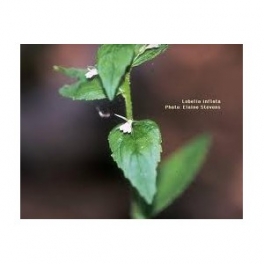INDIAN TOBACCO
Lobelia (Lobelia inflata),
also called Indian tobacco, has a long history of use as an herbal remedy for respiratory conditions such as asthma, bronchitis, pneumonia, and cough. Historically, Native Americans smoked lobelia as a treatment for asthma. In the 19th century, American physicians prescribed lobelia to cause vomiting in order remove toxins from the body. Because of this, it earned the name "puke weed." Today, lobelia is sometimes suggested to help clear mucus from the respiratory tract, including the throat, lungs, and bronchial tubes. Although few studies have evaluated the safety and effectiveness of lobelia, some herbalists today use lobelia as part of a comprehensive treatment plan for asthma.
An active ingredient in the lobelia plant, lobeline, was thought to be similar to nicotine in its effect on the body. For this reason, lobeline was once used as a nicotine substitute in many anti-smoking products and preparations designed to break the smoking habit. In 1993, the U.S. Food and Drug Administration (FDA) prohibited the sale of lobeline-containing smoking products. The FDA reported that such products were not effective in helping people quit or reduce smoking.
Researchers now think that lobeline may actually reduce the effects of nicotine in the body, particularly the release of dopamine. Dopamine is a brain chemical that plays a number of important roles in the brain. It is also involved in drug addiction, so researchers think that lobeline may have some potential in treating addiction. So far, however, there have been no studies to determine whether lobeline is effective.
Lobelia is a potentially toxic herb. It can be safely used in small doses (particularly homeopathic doses), but moderate-to-large doses may cause side effects ranging from dry mouth and nausea to convulsions and even coma (see "Precautions" section). You should use lobelia only under the supervision of your doctor.
Plant Description:
Lobelia is an attractive annual or sometimes biennial (reseeding every year or two) herb that grows to a height of three feet. Its upright, hairy stem is angular, branching at the top, usually green with a tinge of violet. The pale green or yellowish leaves have a sharp taste and a slightly irritating odor. The sparse flowers are pale violet-blue outside and pale yellow inside.
Parts Used:
The above-ground portions of the lobelia plant (namely the leaves and seeds) are used for medicinal purposes.
Medicinal Uses and Indications:
Very few studies have looked at the effect of lobelia in either animals or people. It is sometimes suggested (usually in combination with other herbs) for the treatment of the following respiratory problems:
In homeopathy, lobelia is also used alone or with other products for smoking cessation, muscle relaxation, nausea, vomiting, and various respiratory illnesses.
Available Forms:
Lobelia is available in liquid extracts, tinctures, and as a dried herb in capsules and for teas.
How to Take It:
Begin with lower dosages and increase gradually, depending upon response.
Pediatric
There are no studies evaluating whether it is safe to give lobelia to a child. Avoid use in children unless under the supervision of your doctor.
Adult
The following are recommended adult doses:
- Dried herb (infusion or decoction): ¼ - ½ tsp herb in 8 oz of water, preferably mixed with other herbs. Steep 30 - 40 minutes and take 2 oz (60 mL), 4 times daily. (This method is not preferred because of lobelia's acrid taste.)
- Liquid extract (1:1 in 50 % alcohol): 0.2 - 0.6 mL (4 - 18 drops), 3 times daily
- Tincture of lobelia: 0.6 - 2.0 mL (18 - 60 drops) daily
- Vinegar tincture of lobelia (1:5 in dilute acetic acid): 1 - 4 mL (20 - 120 drops), 3 times daily
Precautions:
The use of herbs is a time-honored approach to strengthening the body and treating disease. Herbs, however, contain substances that can trigger side effects and interact with other herbs, supplements, or medications. For these reasons, herbs should be taken with care, under the supervision a health care provider.
Lobelia is considered a potentially toxic herb. It can cause serious side effects, such as profuse sweating, nausea, vomiting, diarrhea, tremors, rapid heartbeat, mental confusion, convulsions, hypothermia, coma, and possibly even death. Check with your doctor to determine the right dose for you, and do not exceed your doctor's recommended dose.
People with high blood pressure, heart disease, liver disease, kidney disease, tobacco sensitivity, paralysis, seizure disorder, and shortness of breath, and those recovering from shock should not take lobelia.
Pregnant and breastfeeding women should also avoid this herb.
Possible Interactions:
Because so few studies have looked at the effects of lobelia, scientists don't know what medications it might interact with. Based on some of the chemicals contained in lobelia, use caution with the following medications:
Psychiatric medications -- including anti-depressants, anti-anxiety agents, and stimulants (such as those taken for attention deficit hyperactivity disorder)
Nicotine substitutes -- such as nicotine patches or gum
Chantix (varenicline) -- Chantix, a stop-smoking medication, also affects dopamine levels in the brain.
Tobacco -- including cigarettes and smokeless tobacco
Alternative Names:
Asthma weed; Bladderpod; Gagroot; Indian tobacco; Lobelia inflata; Pukeweed; Vomitroot
500g
 Maximize
Maximize







































